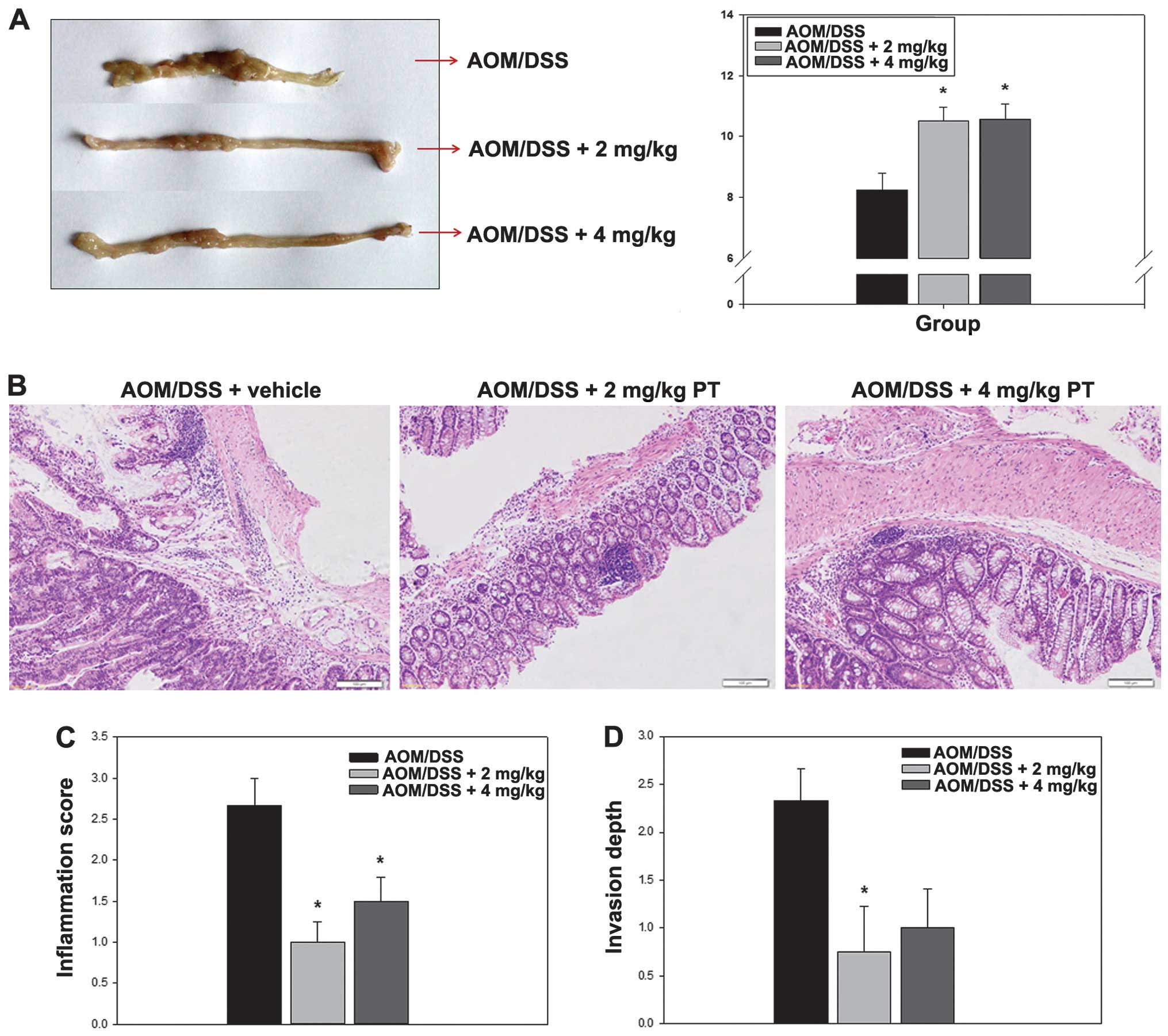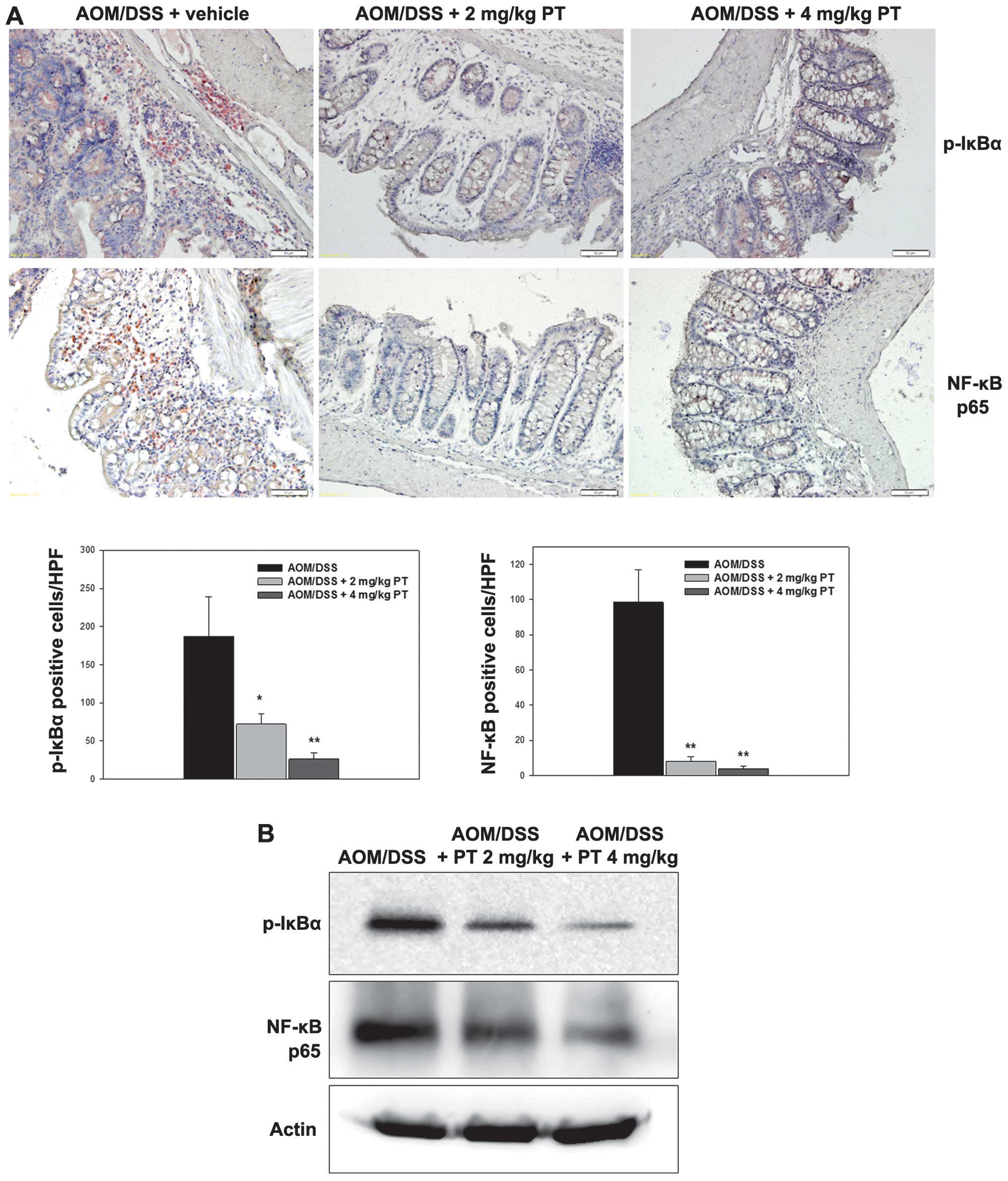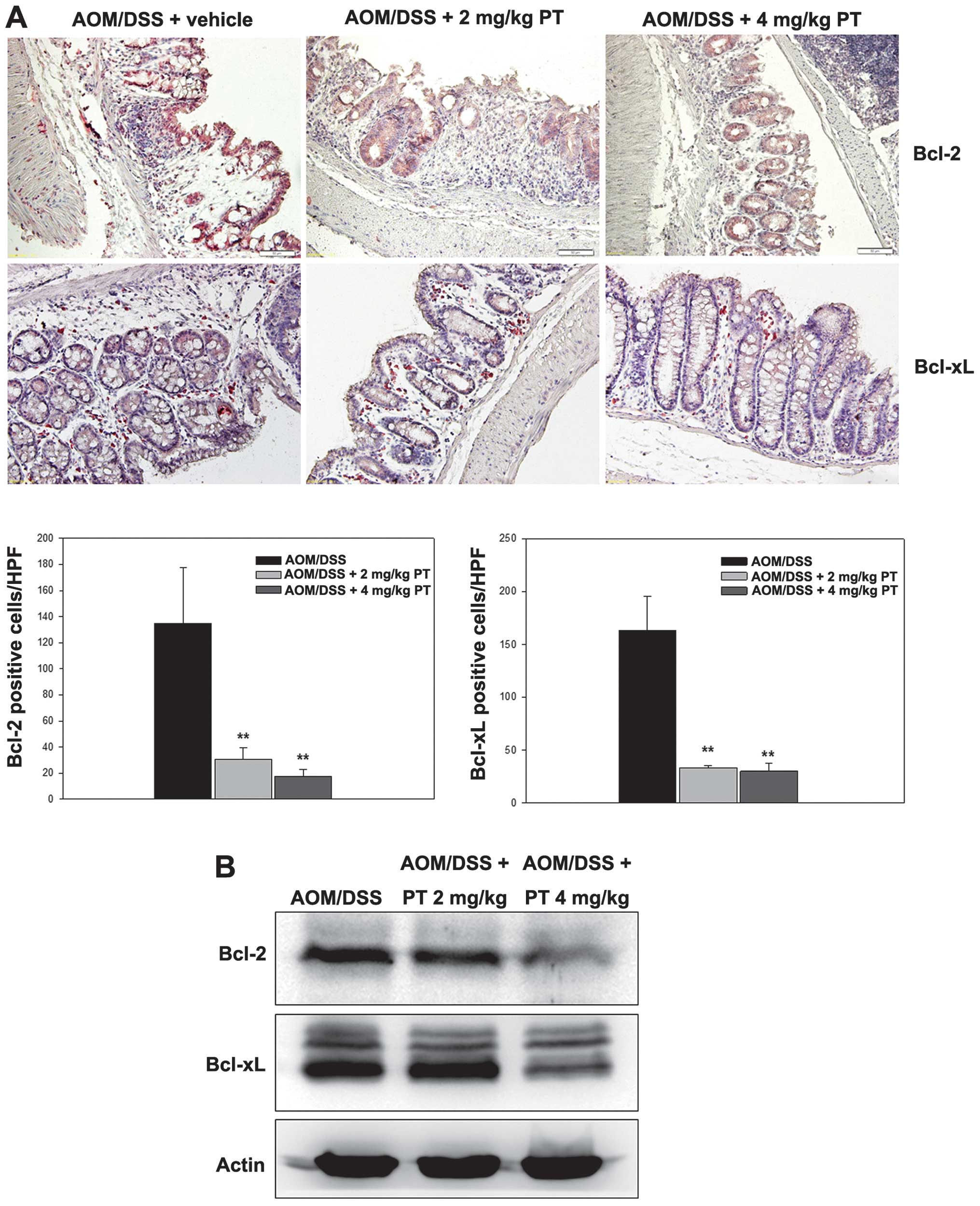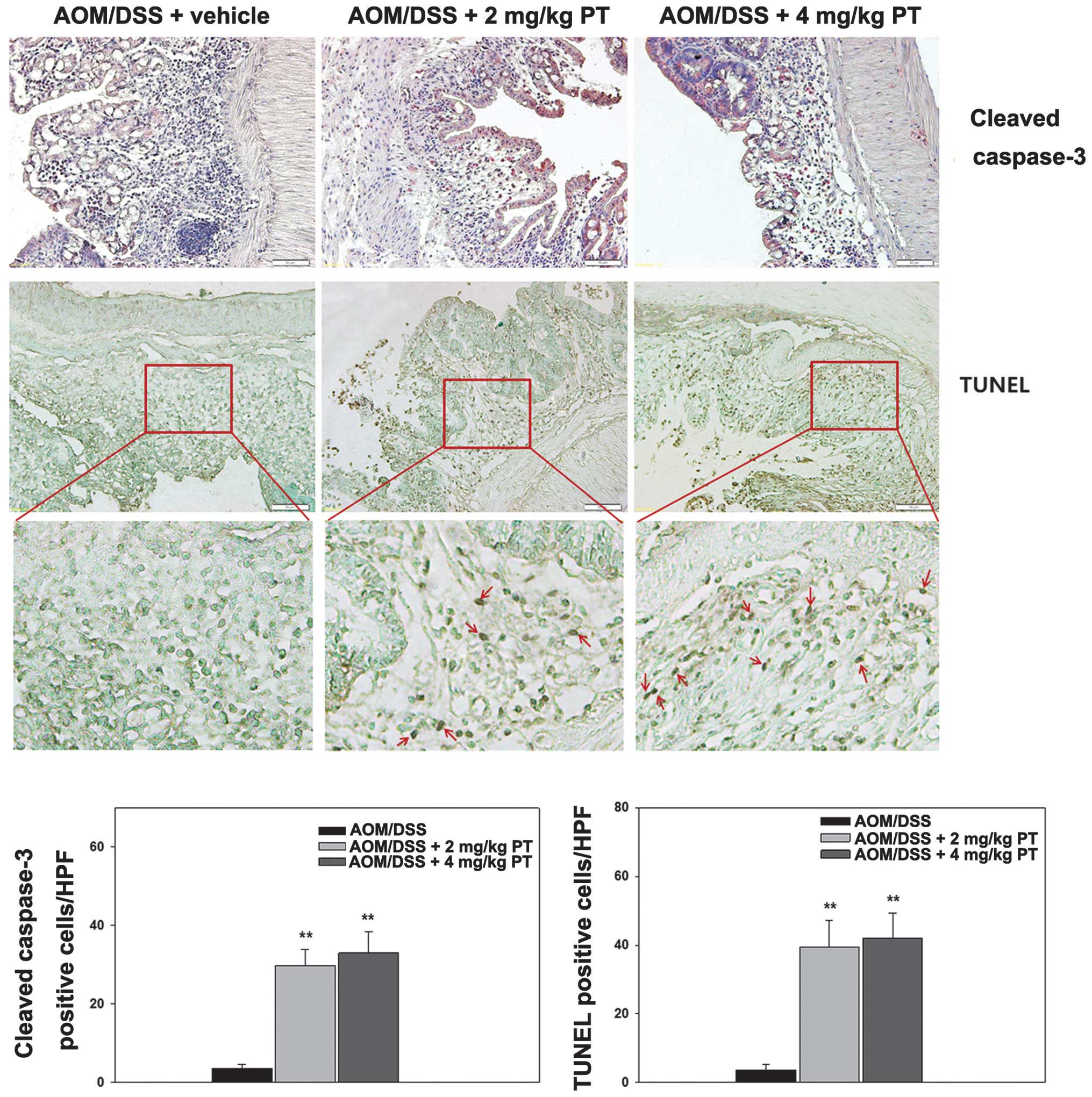|
1
|
Podolsky DK: Inflammatory bowel disease. N
Engl J Med. 347:417–429. 2002. View Article : Google Scholar : PubMed/NCBI
|
|
2
|
Eaden JA, Abrams KR and Mayberry JF: The
risk of colorectal cancer in ulcerative colitis: a meta-analysis.
Gut. 48:526–535. 2001. View Article : Google Scholar : PubMed/NCBI
|
|
3
|
Papadakis KA and Targan SR: Role of
cytokines in the pathogenesis of inflammatory bowel disease. Annu
Rev Med. 51:289–298. 2000. View Article : Google Scholar : PubMed/NCBI
|
|
4
|
Rogler G and Andus T: Cytokines in
inflammatory bowel disease. World J Surg. 22:382–389. 1998.
View Article : Google Scholar : PubMed/NCBI
|
|
5
|
Neurath MF, Fuss I, Schürmann G, et al:
Cytokine gene transcription by NF-kappa B family members in
patients with inflammatory bowel disease. Ann NY Acad Sci.
859:149–159. 1998. View Article : Google Scholar : PubMed/NCBI
|
|
6
|
Blackwell TS and Christman JW: The role of
nuclear factor-kappa B in cytokine gene regulation. Am J Respir
Cell Mol Biol. 17:3–9. 1997. View Article : Google Scholar : PubMed/NCBI
|
|
7
|
Baeuerle PA and Henkel T: Function and
activation of NF-kappa B in the immune system. Annu Rev Immunol.
12:141–179. 1994. View Article : Google Scholar : PubMed/NCBI
|
|
8
|
Baldwin AS Jr: The NF-kappa B and I kappa
B proteins: new discoveries and insights. Annu Rev Immunol.
14:649–683. 1996. View Article : Google Scholar : PubMed/NCBI
|
|
9
|
Knight DW: Feverfew: chemistry and
biological activity. Nat Prod Rep. 12:271–276. 1995. View Article : Google Scholar : PubMed/NCBI
|
|
10
|
Murphy JJ, Heptinstall S and Mitchell JR:
Randomised double-blind placebo-controlled trial of feverfew in
migraine prevention. Lancet. 2:189–192. 1988. View Article : Google Scholar : PubMed/NCBI
|
|
11
|
Hehner SP, Heinrich M, Bork PM, et al:
Sesquiterpene lactones specifically inhibit activation of NF-kappa
B by preventing the degradation of I kappa B-alpha and I kappa
B-beta. J Biol Chem. 273:1288–1297. 1998. View Article : Google Scholar : PubMed/NCBI
|
|
12
|
Lyss G, Knorre A, Schmidt TJ, Pahl HL and
Merfort I: The anti-inflammatory sesquiterpene lactone helenalin
inhibits the transcription factor NF-kappaB by directly targeting
p65. J Biol Chem. 273:33508–33516. 1998. View Article : Google Scholar : PubMed/NCBI
|
|
13
|
Zhang S, Ong CN and Shen HM: Critical
roles of intracellular thiols and calcium in parthenolide-induced
apoptosis in human colorectal cancer cells. Cancer Lett.
208:143–153. 2004. View Article : Google Scholar : PubMed/NCBI
|
|
14
|
Wen J, You KR, Lee SY, Song CH and Kim DG:
Oxidative stress-mediated apoptosis = The anticancer effect of the
sesquiterpene lactone parthenolide. J Biol Chem. 277:38954–38964.
2002. View Article : Google Scholar : PubMed/NCBI
|
|
15
|
Sweeney CJ, Mehrotra S, Sadaria MR, et al:
The sesquiterpene lactone parthenolide in combination with
docetaxel reduces metastasis and improves survival in a xenograft
model of breast cancer. Mol Cancer Ther. 4:1004–1012. 2005.
View Article : Google Scholar : PubMed/NCBI
|
|
16
|
Saadane A, Masters S, Di Donato J, Li J
and Berger M: Parthenolide inhibits IkappaB kinase, NF-kappaB
activation, and inflammatory response in cystic fibrosis cells and
mice. Am J Respir Cell Mol Biol. 36:728–736. 2007. View Article : Google Scholar : PubMed/NCBI
|
|
17
|
Miyata N, Gon Y, Nunomura S, et al:
Inhibitory effects of parthenolide on antigen-induced microtubule
formation and degranulation in mast cells. Int Immunopharmacol.
8:874–880. 2008. View Article : Google Scholar : PubMed/NCBI
|
|
18
|
Hehner SP, Hofmann TG, Dröge W and Schmitz
ML: The antiinflammatory sesquiterpene lactone parthenolide
inhibits NF-kappa B by targeting the I kappaB kinase complex. J
Immunol. 163:5617–5623. 1999.PubMed/NCBI
|
|
19
|
Kwok BH, Koh B, Ndubuisi MI, et al: The
anti-inflammatory natural product parthenolide from the medicinal
herb Feverfew directly binds to and inhibits IkappaB kinase. Chem
Biol. 8:759–766. 2001. View Article : Google Scholar : PubMed/NCBI
|
|
20
|
Kim SL, Trang KT, Kim SH, et al:
Parthenolide suppresses tumor growth in a xenograft model of
colorectal cancer cells by inducing mitochondrial dysfunction and
apoptosis. Int J Oncol. 41:1547–1553. 2012.PubMed/NCBI
|
|
21
|
Wang Y, Zhang HX, Sun YP, et al: Rig-I-/-
mice develop colitis associated with downregulation of G alpha i2.
Cell Res. 17:858–868. 2007. View Article : Google Scholar : PubMed/NCBI
|
|
22
|
Arthur JC, Perez-Chanona E, Mühlbauer M,
et al: Intestinal inflammation targets cancer-inducing activity of
the microbiota. Science. 338:120–123. 2012. View Article : Google Scholar : PubMed/NCBI
|
|
23
|
Pegg AE: Methylation of the O6 position of
guanine in DNA is the most likely initiating event in
carcinogenesis by methylating agents. Cancer Invest. 2:223–231.
1984. View Article : Google Scholar : PubMed/NCBI
|
|
24
|
Popivanova BK, Kitamura K, Wu Y, et al:
Blocking TNF-alpha in mice reduces colorectal carcinogenesis
associated with chronic colitis. J Clin Invest. 118:560–570.
2008.PubMed/NCBI
|
|
25
|
Tanaka T, Suzuki R, Kohno H, et al:
Colonic adenocarcinomas rapidly induced by the combined treatment
with 2-amino-1-methyl-6-phenylimidazo [4,5-b]pyridine and dextran
sodium sulfate in male ICR mice possess beta-catenin gene mutations
and increases immunoreactivity for beta-catenin, cyclooxygenase-2
and inducible nitric oxide synthase. Carcinogenesis. 26:229–238.
2005. View Article : Google Scholar : PubMed/NCBI
|
|
26
|
Kohno H, Suzuki R, Sugie S and Tanaka T:
Beta-Catenin mutations in a mouse model of inflammation-related
colon carcinogenesis induced by 1,2-dimethylhydrazine and dextran
sodium sulfate. Cancer Sci. 96:69–76. 2005. View Article : Google Scholar : PubMed/NCBI
|
|
27
|
Hayden MS and Ghosh S: Shared principles
in NF-kappaB signaling. Cell. 132:344–362. 2008. View Article : Google Scholar : PubMed/NCBI
|
|
28
|
Kim SL, Trang KT, Kim SH, et al:
Parthenolide suppresses tumor growth in a xenograft model of
colorectal cancer cells by inducing mitochondrial dysfunction and
apoptosis. Int J Oncol. 41:1547–1553. 2012.PubMed/NCBI
|
|
29
|
Okayasu I, Ohkusa T, Kajiura K, et al:
Promotion of colorectal neoplasia in experimental murine ulcerative
colitis. Gut. 39:87–92. 1996. View Article : Google Scholar : PubMed/NCBI
|
|
30
|
Greten FR, Eckmann L, Greten TF, et al:
IKKbeta links inflammation and tumorigenesis in a mouse model of
colitis-associated cancer. Cell. 118:285–296. 2004. View Article : Google Scholar : PubMed/NCBI
|
|
31
|
Grivennikov S, Karin E, Terzic J, et al:
IL-6 and Stat3 are required for survival of intestinal epithelial
cells and development of colitis-associated cancer. Cancer Cell.
15:103–113. 2009. View Article : Google Scholar : PubMed/NCBI
|
|
32
|
Sobota R, Szwed M, Kasza A, et al:
Parthenolide inhibits activation of signal transducers and
activators of transcription (STATs) induced by cytokines of the
IL-6 family. Biochem Biophys Res Commun. 267:329–333. 2000.
View Article : Google Scholar : PubMed/NCBI
|
|
33
|
Song JM, Qian X, Upadhyayya P, et al:
Dimethylaminoparthenolide, a water soluble parthenolide, suppresses
lung tumorigenesis through down-regulating the STAT3 signaling
pathway. Curr Cancer Drug Targets. 14:59–69. 2014. View Article : Google Scholar : PubMed/NCBI
|
|
34
|
Luo JL, Kamata H and Karin M:
IKK/NF-kappaB signaling: balancing life and death - a new approach
to cancer therapy. J Clin Invest. 115:2625–2632. 2005. View Article : Google Scholar : PubMed/NCBI
|
|
35
|
Hayden MS and Ghosh S: Signaling to
NF-kappaB. Genes Dev. 18:2195–2224. 2004. View Article : Google Scholar : PubMed/NCBI
|
|
36
|
Karin M and Ben-Neriah Y: Phosphorylation
meets ubiquitination: the control of NF-[kappa]B activity. Annu Rev
Immunol. 18:621–663. 2000. View Article : Google Scholar : PubMed/NCBI
|
|
37
|
Coussens LM and Werb Z: Inflammation and
cancer. Nature. 420:860–867. 2002. View Article : Google Scholar : PubMed/NCBI
|
|
38
|
Lawrence T, Willoughby DA and Gilroy DW:
Anti-inflammatory lipid mediators and insights into the resolution
of inflammation. Nat Rev Immunol. 2:787–795. 2002. View Article : Google Scholar : PubMed/NCBI
|
|
39
|
Vakkila J and Lotze MT: Inflammation and
necrosis promote tumour growth. Nat Rev Immunol. 4:641–648. 2004.
View Article : Google Scholar : PubMed/NCBI
|
|
40
|
Schottenfeld D and Beebe-Dimmer J: Chronic
inflammation: a common and important factor in the pathogenesis of
neoplasia. CA Cancer J Clin. 56:69–83. 2006. View Article : Google Scholar : PubMed/NCBI
|
|
41
|
Schottenfeld D and Beebe-Dimmer JL:
Advances in cancer epidemiology: understanding causal mechanisms
and the evidence for implementing interventions. Annu Rev Public
Health. 26:37–60. 2005. View Article : Google Scholar : PubMed/NCBI
|
|
42
|
Neurath MF, Pettersson S, Meyer zum
Büschenfelde KH and Strober W: Local administration of antisense
phosphorothioate oligonucleotides to the p65 subunit of NF-kappaB
abrogates established experimental colitis in mice. Nat Med.
2:998–1004. 1996. View Article : Google Scholar : PubMed/NCBI
|
|
43
|
Rogler G, Brand K, Vogl D, Page S,
Hofmeister R, et al: Nuclear factor kappaB is activated in
macrophages and epithelial cells of inflamed intestinal mucosa.
Gastroenterology. 115:357–369. 1998. View Article : Google Scholar : PubMed/NCBI
|
|
44
|
Ardite E, Panés J, Miranda M, et al:
Effects of steroid treatment on activation of nuclear factor kappaB
in patients with inflammatory bowel disease. Br J Pharmacol.
124:431–433. 1998. View Article : Google Scholar : PubMed/NCBI
|
|
45
|
Kang BY, Chung SW and Kim TS: Inhibition
of interleukin-12 production in lipopolysaccharide-activated mouse
macrophages by parthenolide, a predominant sesquiterpene lactone in
Tanacetum parthenium:involvement of nuclear factor-kappaB. Immunol
Lett. 77:159–163. 2001. View Article : Google Scholar : PubMed/NCBI
|
|
46
|
Zhao ZJ, Xiang JY, Liu L, Huang XL and Gan
HT: Parthenolide, an inhibitor of the nuclear factor-κB pathway,
ameliorates dextran sulfate sodium-induced colitis in mice. Int
Immunopharmacol. 12:169–174. 2012. View Article : Google Scholar : PubMed/NCBI
|
|
47
|
Wang CY, Mayo MW and Baldwin AS Jr: TNF-
and cancer therapy-induced apoptosis: potentiation by inhibition of
NF-kappaB. Science. 274:784–787. 1996. View Article : Google Scholar : PubMed/NCBI
|
|
48
|
Van Antwerp DJ, Martin SJ, Kafri T, Green
DR and Verma IM: Suppression of TNF-alpha-induced apoptosis by
NF-kappaB. Science. 274:787–789. 1996. View Article : Google Scholar : PubMed/NCBI
|
|
49
|
Beg AA and Baltimore D: An essential role
for NF-kappaB in preventing TNF-alpha-induced cell death. Science.
274:782–784. 1996. View Article : Google Scholar : PubMed/NCBI
|
|
50
|
Wang YW, Wang SJ, Zhou YN, Pan SH and Sun
B: Escin augments the efficacy of gemcitabine through
down-regulation of nuclear factor-κB and nuclear
factor-κB-regulated gene products in pancreatic cancer both in
vitro and in vivo. J Cancer Res Clin Oncol. 138:785–797. 2012.
View Article : Google Scholar : PubMed/NCBI
|
|
51
|
Sun JG, Chen CY, Luo KW, et al:
3,5-Dimethyl-H-furo[3,2-g]chromen-7-one as a potential anticancer
drug by inducing p53-dependent apoptosis in human hepatoma HepG2
cells. Chemotherapy. 57:162–172. 2011. View Article : Google Scholar : PubMed/NCBI
|


















